The Book of Ruth is included in the third division, or the Writings (Ketuvim), of the Hebrew Bible. In most Christian canons it is treated as one of the historical books and placed between Judges and 1 Samuel.

Moab is the name of an ancient Levantine kingdom whose territory is today located in the modern state of Jordan. The land is mountainous and lies alongside much of the eastern shore of the Dead Sea. The existence of the Kingdom of Moab is attested to by numerous archaeological findings, most notably the Mesha Stele, which describes the Moabite victory over an unnamed son of King Omri of Israel, an episode also noted in 2 Kings 3. The Moabite capital was Dibon. According to the Hebrew Bible, Moab was often in conflict with its Israelite neighbours to the west.

Boaz is a biblical figure appearing in the Book of Ruth in the Hebrew Bible and in the genealogies of Jesus in the New Testament and also the name of a pillar in the portico of the historic Temple in Jerusalem. The word is found 24 times in the Scriptures, two being in Greek.
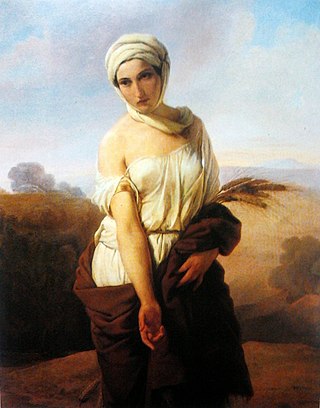
Ruth is the person after whom the Book of Ruth is named. She was a Moabite woman who married an Israelite. After the death of all the male members of her family, she stays with her mother-in-law, Naomi, and moves to Judah with her, where Ruth wins the love and protection of a wealthy relative, Boaz, through her kindness. She is the great-grandmother of David.
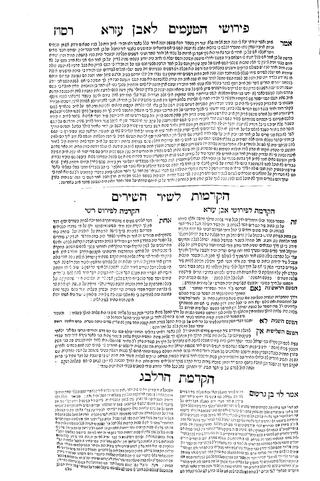
Ruth 2 is the second chapter of the Book of Ruth in the Hebrew Bible and in the Old Testament of the Christian Bible. This chapter contains the story of Ruth gleaning in the fields of Boaz, her deceased husband's near kinsman, and he notices her, Ruth 2:1-7; Boaz shows her great kindness, and blesses her, Ruth 2:8-16; Ruth brings what she got to Naomi; and tells her about Boaz; Naomi gives God thanks, and exhorts Ruth to continue in the field, Ruth 2:17-23.

Jeremiah 1 is the first chapter of the Book of Jeremiah in the Hebrew Bible or the Old Testament of the Christian Bible. This book, one of the Nevi'im or Books of the Prophets, contains the prophecies attributed to the prophet Jeremiah. This chapter serves as an introduction to the Book of Jeremiah and relates Jeremiah's calling as a prophet.
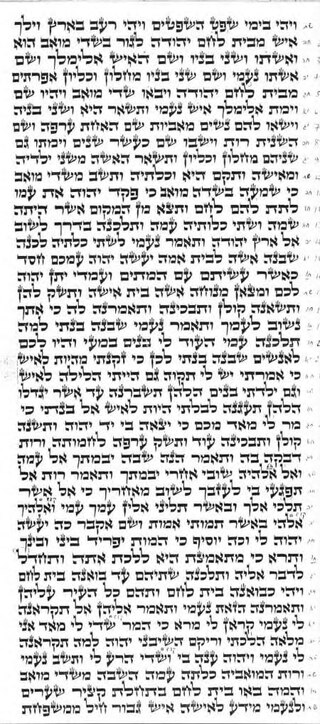
Ruth 1 is the first chapter of the Book of Ruth in the Hebrew Bible or the Old Testament of the Christian Bible, part of the Ketuvim ("Writings"). This chapter contains the story of how Elimelech, Ruth's father-in-law, driven by famine, moved into Moab, and died there ; Naomi returning home, Ruth accompanies her ; They came to Bethlehem.
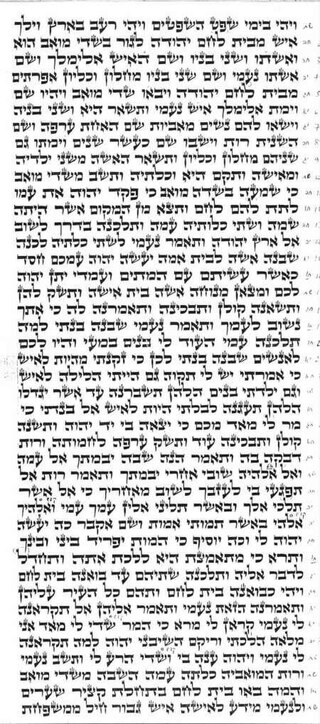
Ruth 3 is the third chapter of the Book of Ruth in the Hebrew Bible or the Old Testament of the Christian Bible, part of the Ketuvim ("Writings"). This chapter contains the story of how on Naomi's advice, Ruth slept at Boaz's feet, Ruth 3:1-7; Boaz commends what she had done, and acknowledges the right of a kinsman; tells her there was a nearer kinsman, to whom he would offer her, and if that man refuses, Boaz would redeem her, Ruth 3:8-13; Boaz sends her away with six measures of barley, Ruth 3:14-18.

Jeremiah 2 is the second chapter of the Book of Jeremiah in the Hebrew Bible or the Old Testament of the Christian Bible. This book contains prophecies attributed to the prophet Jeremiah, and is one of the Books of the Prophets. Chapters 2 to 6 contain the earliest preaching of Jeremiah on the apostasy of Israel. Verses 2:1 to 3:5 dramatize the ending of "marriage" between Yahweh and Israel.

Ezekiel 20 is the twentieth chapter of the Book of Ezekiel in the Hebrew Bible or the Old Testament of the Christian Bible. This book contains the prophecies attributed to the prophet/priest Ezekiel, and is one of the Books of the Prophets. In chapters 20 to 24 there are "further predictions regarding the fall of Jerusalem". In this chapter, Ezekiel speaks on God's behalf to some of the elders of Israel.

Jeremiah 11 is the eleventh chapter of the Book of Jeremiah in the Hebrew Bible or the Old Testament of the Christian Bible. This book contains prophecies attributed to the prophet Jeremiah, and is one of the Books of the Prophets. This chapter includes the first of the passages known as the "Confessions of Jeremiah".

Jeremiah 19 is the nineteenth chapter of the Book of Jeremiah in the Hebrew Bible or the Old Testament of the Christian Bible. This book contains prophecies attributed the prophet Jeremiah, and is one of the Books of the Prophets.

2 Kings 11 is the eleventh chapter of the second part of the Books of Kings in the Hebrew Bible or the Second Book of Kings in the Old Testament of the Christian Bible. The book is a compilation of various annals recording the acts of the kings of Israel and Judah by a Deuteronomic compiler in the seventh century BCE, with a supplement added in the sixth century BCE. This chapter records the reign of Athaliah and Joash as the rulers of Judah.

1 Chronicles 13 is the thirteenth chapter of the Books of Chronicles in the Hebrew Bible or the First Book of Chronicles in the Old Testament of the Christian Bible. The book is compiled from older sources by an unknown person or group, designated by modern scholars as "the Chronicler", and had the final shape established in late fifth or fourth century BCE. This chapter contains the account of an unsuccessful attempt to bring the ark of the covenant to Jerusalem by David. The whole chapter belongs to the section focusing on the kingship of David.

1 Samuel 8 is the eighth chapter of the First Book of Samuel in the Old Testament of the Christian Bible or the first part of the Books of Samuel in the Hebrew Bible. According to Jewish tradition the book was attributed to the prophet Samuel, with additions by the prophets Gad and Nathan, but modern scholars view it as a composition of a number of independent texts of various ages from c. 630–540 BCE. This chapter records the request from the elders of Israel to Samuel for a king, part of a section comprising 1 Samuel 7–15 which records the rise of the monarchy in Israel and the account of the first years of King Saul.
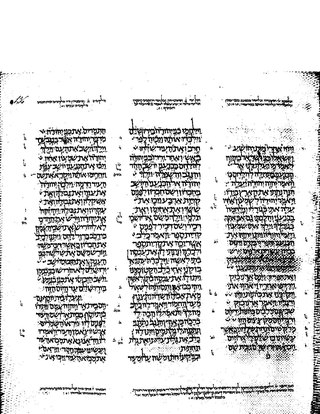
Judges 12 is the twelfth chapter of the Book of Judges in the Old Testament or the Hebrew Bible. According to Jewish tradition the book was attributed to the prophet Samuel, but modern scholars view it as part of the Deuteronomistic History, which spans in the books of Deuteronomy to 2 Kings, attributed to nationalistic and devotedly Yahwistic writers during the time of the reformer Judean king Josiah in 7th century BCE. This chapter records the activities of judges Jephthah, Ibzan, Elon, and Abdon. belonging to a section comprising Judges 6:1 to 16:31.

Judges 17 is the seventeenth chapter of the Book of Judges in the Old Testament or the Hebrew Bible. According to Jewish tradition the book was attributed to the prophet Samuel, but modern scholars view it as part of the Deuteronomistic History, which spans in the books of Deuteronomy to 2 Kings, attributed to nationalistic and devotedly Yahwistic writers during the time of the reformer Judean king Josiah in 7th century BCE. This chapter records the activities of Micah of Ephraim. belonging to a section comprising Judges 17 to 21.

Judges 18 is the eighteenth chapter of the Book of Judges in the Old Testament or the Hebrew Bible. According to Jewish tradition the book was attributed to the prophet Samuel, but modern scholars view it as part of the Deuteronomistic History, which spans in the books of Deuteronomy to 2 Kings, attributed to nationalistic and devotedly Yahwistic writers during the time of the reformer Judean king Josiah in 7th century BCE. This chapter records the activities of the tribe of Dan, and belongs to a section comprising Judges 17 to 21.

Judges 19 is the nineteenth chapter of the Book of Judges in the Old Testament or the Hebrew Bible. According to Jewish tradition the book was attributed to the prophet Samuel, but modern scholars view it as part of the Deuteronomistic History, which spans in the books of Deuteronomy to 2 Kings, attributed to nationalistic and devotedly Yahwistic writers during the time of the reformer Judean king Josiah in 7th century BCE. This chapter records the activities of a Levite from Ephraim and his concubine, belonging to a section comprising Judges 17 to 21.
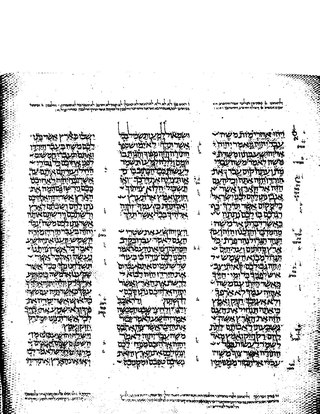
Joshua 20 is the twentieth chapter of the Book of Joshua in the Hebrew Bible or in the Old Testament of the Christian Bible. According to Jewish tradition the book was attributed to the Joshua, with additions by the high priests Eleazar and Phinehas, but modern scholars view it as part of the Deuteronomistic History, which spans the books of Deuteronomy to 2 Kings, attributed to nationalistic and devotedly Yahwistic writers during the time of the reformer Judean king Josiah in 7th century BCE. This chapter records the designation of the cities of refuge, a part of a section comprising Joshua 13:1–21:45 about the Israelites allotting the land of Canaan.



















